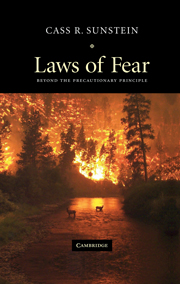6 - Costs and Benefits
Published online by Cambridge University Press: 05 September 2012
Summary
Cost-benefit analysis has become an increasingly popular tool for the assessment and management of social risks. Indeed, cost-benefit analysis is often urged as an alternative to the Precautionary Principle. Instead of blindly “taking precautions,” it is argued, regulators should tally up the benefits of regulation and its costs, and choose the approach that maximizes net benefits. This approach is often justified on grounds of economic efficiency. On this view, regulators should proceed if the costs exceed the benefits, but not otherwise. I do not endorse this view. Efficiency is relevant, but it is hardly the only goal of regulation. Citizens in a democratic society might well choose to protect endangered species, or wildlife, or pristine areas, even if it is not efficient for them to do so. And if poor people stand to gain from regulatory protection, such protection might be worthwhile even if rich people stand to lose somewhat more.
I believe that the arguments made thus far establish a cognitive case for cost-benefit analysis – that is, an argument for cost-benefit analysis that does not depend on economic efficiency, but that stresses the possibility that an account of costs and benefits can respond to the problems that human beings face in thinking about risks. If the availability heuristic leads people to misestimate probabilities, then cost-benefit analysis can give them a more accurate sense of the actual harms against which protection is sought.
- Type
- Chapter
- Information
- Laws of FearBeyond the Precautionary Principle, pp. 129 - 148Publisher: Cambridge University PressPrint publication year: 2005
- 1
- Cited by



